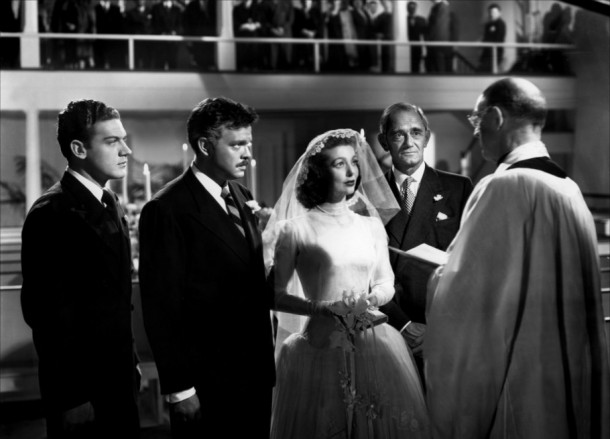I debated putting up yet another Orson Welles recommendation this month, but it is Noirvember and a number of Welles’s films are right now available to stream on Netflix. The Stranger has circulated in public domain prints of varying quality, but it should not therefore be dismissed as a lesser Welles. This is a film about literal Nazis lurking in our midst, trying to imbue young minds with fascist ideologies, and influencing Supreme Court Justices. It’s kind of apropos right now.

The Stranger features Welles in the lead role of Charles Rankin, a prep school teacher in a Connecticut town, where he’s engaged to marry Mary Longstreet (Loretta Young), the daughter of a Supreme Court Justice (Philip Merivale). But two men have arrived in town to challenge Rankin’s identity: Mr. Wilson (Edward G. Robinson) is convinced that Rankin is actually Franz Kindler, an architect of the Nazis’ Final Solution, who fled a war crimes commission and has erased all evidence of his fascist past. Wilson has tracked Kindler’s former comrade Meinike (Konstantin Shayne) to Connecticut, where he hopes Meinike will serve to expose Rankin as the war criminal that he is.
Like Shadow of a Doubt, The Stranger is about evil invading a small town, insinuating itself into the lives of the people by presenting a charming, likable, and, most importantly, convincing face. Rankin’s position as a teacher carries with it undeniable authority, that he is responsible for shaping young minds, and that he promotes fascist ideals and premises under the guise of philosophy. His connection to the Longstreets, a powerful and influential political family, further serve to cement his infiltration into the comfort and safety of small town America, and his chipping away of it from within. Rankin refutes the idea that reformation of a fascist is possible, promoting concepts that Germany is at base a totalitarian nation, and rejecting, in one indicative moment, the idea that Karl Marx was German: “Marx wasn’t a German; Marx was a Jew.” During the same conversation, he claims that Germany itself, and all its people, must be eradicated, formulating a sort of “America first” mentality that simply transfers the ideology of the German Nazis to the ideology of American dominance. It’s a canny little shift into post-war critique, illustrating how totalitarian ideologies overlap with each other.
Welles is a charming figure as Rankin—it’s perfectly understandable how he has managed to reconfigure himself as a likable gentleman who seduces Loretta Young. He’s still quite young here, a mere five years after Citizen Kane, and it is his arch proffering of insidious ideals and evils that give The Stranger its energy. Set against him is Edward G. Robinson, universally disliked in the tiny town, who nonetheless represents the good and the just against Rankin’s insidious evil. It’s a clever undercutting of fascistic concepts, that the good and pure are beautiful and the evil are ugly – Robinson is harsh and jarring and largely unlikable, but he’s on the side of right. This is a film about fascists presenting their ideas under the guise of intellectual superiority, but defeated by the intelligence and canniness of the men and women they so despise.
The Stranger remains an odd entry into the Wellesian canon. It is the most clearly anti-fascistic, playing on the very real fears about Nazi war criminals fleeing prosecution and the possibility that some might settle in America. But it’s not the purpose of this film to treat Rankin as a vague foreign threat, or to whip up anti-immigrant sentiment. It’s rather a competition of ideals, of the goodness represented by Robinson, by Young, and by at least some of the inhabitants of the town, while Rankin works on the minds and souls of the more easily corrupted. It doesn’t exactly qualify as war propaganda, nor is it an early entry into Cold War politics. It’s an excellent film noir that expresses its anti-totalitarian sentiment by putting the words of a fascist into the director’s mouth. You want some good Welles in which fascists get punched? Try out The Stranger.
The Stranger is available to stream on Netflix.

